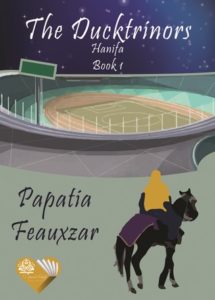 When The Ducktrinors first landed on MMW’s virtual desk, I volunteered to read and review it. Feauxzar’s novel is nothing like any of the other books I’ve read recently. These days, I tend to read a variety of nonfiction, but The Ducktrinors is advertised as a Muslim Science-Fiction Young Adult novel. I’ve been meaning to read more science-fiction, and I was in the mood for something interesting and lightweight. As it turns out, the book wasn’t very light, but it was certainly quite engaging.
When The Ducktrinors first landed on MMW’s virtual desk, I volunteered to read and review it. Feauxzar’s novel is nothing like any of the other books I’ve read recently. These days, I tend to read a variety of nonfiction, but The Ducktrinors is advertised as a Muslim Science-Fiction Young Adult novel. I’ve been meaning to read more science-fiction, and I was in the mood for something interesting and lightweight. As it turns out, the book wasn’t very light, but it was certainly quite engaging.
The opening pages of The Ducktrinors feature a mix of character lists and notes on some of the Islamic concepts mentioned in the book. While the Islamic concepts might be useful for someone learning about Islam, I found the character list long and unnecessary, especially since a number of the characters listed are of little importance in the grand scheme of the story.
In the first few chapters, we learn the premise of the narrative: Hanifa Ducktrinor (the protagonist) and her family are pious Muslims who are hiding their faith because the Seculars (the ruling power) are persecuting anyone who openly practices their faith. Religion is banned, and education is discouraged because the leaders know that those with education have the power to overthrow the government. Despite her situation—and her parents’ explicit orders to keep a low profile—Hanifa attends all of her classes and finds a way to fulfil her religious obligations during the day. Eventually, the rebellious young woman decides to stage an uprising.
Because I haven’t read a YA novel in many years, I’m not quite sure how to critique The Ducktrinors. At times, I found the dialogue to be a bit forced; there were moments when the characters didn’t seem genuine. Rather, they seemed to be not much more than vehicles that move the plot along. Seeing as Feauxzar’s novel is meant for younger readers who might need a little more guiding, I forgave the painful dialogue. The plot, however, was an even greater disappointment.
In the beginning, the plot was exciting enough to keep me interested, but after a certain point, I could guess what would happen in the rest of the novel. Granted, part of this guessing was so successful because I know that The Ducktrinors is the first book in a series. Still, I was hoping for something that surprised me. Even though I feel like I can probably guess how the series will end, I’m willing to continue reading to see if my suspicions are confirmed. I’m also still holding out hope that something interesting will happen along the way.
The abovementioned criticisms are by no means intended to discourage anyone from reading the book. Actually, I’d recommend The Ducktrinors, simply because of the feeling I had when I finished the novel: I felt good. Sure, I was upset by the way the novel ended (Hanifa’s reaction to the turn of events seemed extremely uncharacteristic), but overall, I felt like I’d just read something good. Perhaps I found the Islamic influence that seeped through the novel refreshing, or maybe I was glad to read about another strong, smart, female protagonist. Whatever the reason, I’ve been thinking about the book since I finished it several days ago, and I’ve recommended it to a friend or two.
Although Feauxzar classified The Ducktrinors as a young adult novel, the somewhat graphic violence, coupled with the suggestions of sexual activity (I think there’s even a suggestion of sexual assault in the novel, but it isn’t stated explicitly enough for me to say for sure) make me shy away from recommending this novel to anyone under the age of 14. While I’m not one to shelter children from the realities of the adult world, there are situations that might potentially be confusing for a younger audience. Parents who monitor what their children read might want to glance through the novel before handing it over.
The aspects that give me pause, however, are the very aspects I find endearing. Hanifa’s character handles quite a lot. Her relationship with her parents grows increasingly more strained as she struggles to keep her plans secret from them while maintaining their respectful relationship. In addition, she’s experiencing lust, loss, anger, and determination—in other words, she’s a teenager coming to age while trying to save the world. She gives off a strong Katniss Evergreen vibe, though I wouldn’t quite describe the book as a halal version of The Hunger Games.
After reading The Ducktrinors, I’m curious as to what else Feauxzar has in store. She has a number of books available on amazon but at a glance, The Ducktrinors appears to be the only young adult novel. Feauxzar’s current book list gives me a Judy Blume vibe; it seems like she’s going for a mix of young adult and adult contemporary novels. This mix is part of what interests me about Feauxzar, and I’m curious to see whether her writing voice changes depending on the age group of the novel. I hope to see a more complex plot and more refined dialogue in her adult novels, but I enjoyed The Ducktrinors despite its flaws.


1 Comment
[…] The Ducktrinors first landed on MMW’s virtual desk, I volunteered to read and review it. Feauxzar’s novel is nothing like any of the other books […]